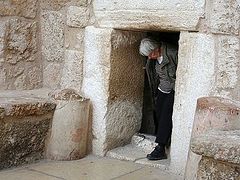His Eminence Metropolitan Athanasios of Limassol continues his consideration of the true meaning of humility, according to the teachings of St. John Climacus, as found in his spiritual classic, The Ladder of Divine Ascent. All quotes from The Ladder are taken from the Archimandrite Lazarus (Moore) translation published by Holy Transfiguration Monastery.
***
And again another said: “[Humility is] the feeling of a contrite soul, and the renunciation of one’s own will” (Ladder of Divine Ascent 25.3).
That is, to humble yourself means to cut off your will, to render obedience, which is the mother of humility, because all our egotism, our whole being is concentrated, manifested, and expressed in our will. Therefore, in monasticism, the first virtue, the first vow that a monk takes at his tonsure, is obedience—the cutting off of his will—which is a prerequisite for spiritual perfection.
And this is true not only in monasticism, but in marriage as well. If the married person fails to cut off his own will and reject it, sacrificing himself for the sake of the other, then he won’t know peace. There’s no peace in his soul, as said the Lord: Learn of Me; for I am meek and lowly in heart: and ye shall find rest unto your souls (Mt. 11:29). If a man tastes what great freedom comes from the cutting off of his own will and expecting nothing from the other, from perfecting himself in voluntary self-sacrifice for the sake of the other, then he will truly be eager to sacrifice himself and cut off his will.
There are saints who went and sold themselves into slavery to cruel and inhuman idolaters and became their servants in order to cut off their will—thus responding to this thirst to sacrifice themselves in service to another. And in those days, servants weren’t like those today who get paid. The master could simply destroy them then, even physically.
Further, St. John Climacus says:
But when I had listened to all this and had attentively and soberly considered it, I found that I had not been able to comprehend the blessed sense of that virtue from what had been said (25.3).
Therefore, despite all this, nothing that we have said thus far is yet the essence of humility, but is only a sign, a symptom, a path leading there—it is not yet humility itself. All this is the path, but not the end.
And the saint continues:
I too gave my definition of it and said: “Humility is a nameless grace in the soul. It is grace” (25.3).
It is an indefinable, subtle grace in the soul of man; a precious grace, so exalted that no name can limit it. Humility is so rich and so perfect that it can’t be limited by one definition or name. And it is grace, inasmuch as it’s given by the Holy Spirit, and can be designated only by those who have experienced it.
That is, humility is the experience of the one who possesses it; only he can express it. It is an inexpressible wealth; it is the name of God.
That is, humility is the name of God, and it is nameless, inasmuch as God has no name. He has many names, but none of them expresses Him.
It is a gift from God, for it is said: Learn not from an angel, not from man, and not from a book, but from Me, that is, from My indwelling, from My illumination and action in you, for I am meek and humble in heart and in thought and in spirit, and your souls shall find rest from conflicts and relief from tempting thoughts (25.3).
And the holy father continues with the following words:
The appearance of this sacred vine is one thing during the winter of the passions, another in the spring of fruit-blossom, yet another in the actual harvest of the virtues (25.4).
St. John the Sinaite explains that when the cluster of this sacred vine begins to blossom within us, that is, the first fruit of humility, we feel exhaustion from all human glory and praise, and hatred for them. And at the same time, we drive the anger and rage out of ourselves.
That is, the first result of humility, the first flower of this sacred vine, its first fruit is when we tire of glory and praise. Our soul grows weary of the praise of others, and it doesn’t just grow weary, but also hates praise and human glory. With this hatred, anger leaves us. And vice versa: Love of glory and praise and anger are sicknesses coming from the lack of humility. This [weariness of praise, etc.]is the first sign that blessed humility has appeared in us; the first fruit.
When humility, this queen of virtues, begins to assert itself in the soul to the measure of our spiritual age, we begin to consider every good thing that we do as nothing, or rather, to consign our good deeds to oblivion. We think that the burden of our sins grows with each passing day, and because of our secret and unconscious sins and neglect, the wealth of our soul is squandered.
That is, when a man succeeds a little more, then he considers the good works he does as abominations, and even abhors them. What he willingly boasted about—his good deeds—he now considers to be abominations, something vile, and he is clearly aware of his great negligence, infirmities, and sins. Spiritual vision increases, spiritual insight sharpens, and thus he can easily identify the spiritual infirmity burdening his soul.
We suspect the very abundance of the Divine gifts showered upon us to be beyond our deserts and to aggravate our punishment (25.4).
In other words, if we reach a point where we receive gifts from God, we will have spiritual achievements, and we become the kind of people that others want to listen to, to consult with, to seek consolation from; that is, we will be the cause of spiritual benefit for others. The humble man considers all of this as nothing; and not only as nothing, but even as the reason for his condemnation, because he doesn’t deserve it, but God gives it to him. He deserves great punishment, because despite the fact that he has so many gifts, he doesn’t respond to God properly. The mind thus protects itself from dangers and isn’t tainted with self-love and self-conceit.
And when he gets to this state, then
he hears the knocks and jeers of the thieves, without being subject to any of their threats; because modesty is an inviolable safe (25.4).
For the humble man, there is no danger that satan will be able to use vainglory and self-love to steal what he gathers within himself, because he already believes that he possesses nothing. Whoever believes he has nothing has Christ within himself.
Why do you think Christ justified the harlot, the woman caught in adultery, the woman with the issue of blood, the Canaanite woman, the Thief, the Prodigal Son, and rejected the virtuous Pharisee? The Pharisees had reason to be proud: They had their own fasting, almsgiving, good deeds, prayers, and observance of the Law of Moses. They were outwardly virtuous, but all their wealth was robbed by pride. The others had nothing, but there was something that suddenly exalted them. What was it? Humility.
 St. John Climacus That is, a humble sinner is kindly received by God, and a proud saint is an abomination before Him. That is, St. John says, if pride alone has cast down angels from Heaven and made them demons, then understand that humility alone makes demons angels.1 That is, only a humble spirit by itself saves a man, even if he has nothing else.
St. John Climacus That is, a humble sinner is kindly received by God, and a proud saint is an abomination before Him. That is, St. John says, if pride alone has cast down angels from Heaven and made them demons, then understand that humility alone makes demons angels.1 That is, only a humble spirit by itself saves a man, even if he has nothing else.
We can say that this is the truly the easiest, most direct, and safest path to the Kingdom of God. Therefore, I often recall what I constantly hear, mainly in Confession. When a man comes, despairing that he does no good deeds and makes no progress in the spiritual life, we tell him:
“My child, cling to repentance and humility and don’t seek anything else!”
But he doesn’t understand. He says:
“But why don’t I need the virtues? If I do that, I won’t go to hell? If I do that, I won’t condemn myself?”
And you repeat:
Leave all of this and keep humility and repentance within yourself! That’s what God wants from you. He doesn’t want works; for what is He supposed to do with your works when you have no repentance? What’s He supposed to do with your fasting, your prostrations, your alms, and all these external deeds, which are only a path that can lead to humility? What happens if you start upon the path but reject its end—humility?
That is, you’re like a man who says: “I want to go to Limassol!” and heads out on the road, and he gets there, but returns without having entered the city. He approaches it and returns, and again approaches it and returns, again without going in. And he calms himself with the thoughts: “If I’m on the road, then that’s what I need!” But it’s not what he needs. The end is the important part. And the end is repentance. The rest only contributes to the work of repentance. If you reject repentance and cling to the external, then you are like a tree that has leaves but no spiritual fruit.
St. John Climacus also says that
Painstaking repentance, mourning cleansed of all impurity, and holy humility in beginners, are as different and distinct from each other as yeast and flour from bread (25.6).
That is, the components are repentance, weeping, and humility, like flour, water, and salt for bread. All of this is mixed by God’s grace and becomes baked bread—spiritual food.
Then St. John Climacus speaks about the properties of humility:
The first and paramount property of this excellent and admirable trinity is the acceptance of indignity with the greatest pleasure, when the soul receives it with outstretched hands and welcomes it as something that relieves and cauterizes diseases of the soul and great sins (25.7).
I remember one man who went to the Holy Mountain to become a monk. He was rather irascible, and, of course, couldn’t stand it. He stayed only for one week. However, he told us:
“You’re the ones to blame: You don’t give me any peace!”
That is, for him, we were all to blame because we were the reason he was annoyed. The anger that was in him wasn’t to blame—the reasons for the anger were to blame. Then he left and started living alone. One time he got so angry that he broke a chair, and then the Elder asked him:
“You said that we’re to blame. So now what, is the chair guilty? I mean, the chair doesn’t talk or do anything. What, don’t you understand that the problem is internal, in you, and not external?”
Therefore, the man who wants to acquire humility must have the strength to joyfully accept dishonor, sorrow, and malice from people. This sounds paradoxical and strange for a modern person today. Accepting dishonor? Malice and injustice? But how is that possible?
Of course, if you limit your life to this world and there’s no sense of the Kingdom of God in you, namely the sense that there’s a battlefield here, and that you’re fighting for the Kingdom of God and for the indwelling of God within you, then things that are sorrowful, grievous, and difficult now seem unacceptable and incomprehensible. However, if you understand that here, where we are, our goal is to labor, to deliver ourselves from passions, to meet Christ Who lives and abides in our hearts, to have Him in ourselves forever in His Kingdom, then you’ll be able to overcome this perception of present things, and it won’t be that everything seems difficult and that you can’t bear anything.
Some may object: “Okay, but should my life really pass in tears, denial, and contempt?”
If we loved Christ, then we would say with great joy: “My God, I’m ready not to have any peace in this world, not even for a moment, and were it possible, as says the Prophet David, to drink my tears instead of water every day,2 because I have come to realize what real life means; I have come to realize what my goal is. And to meet Thee, I would use the last second, I would use it for spiritual podvig, accepting every dishonor, contempt, and pain—just to be cleansed and to be ready to meet Thee.”
Therefore, St. John writes that humility means accepting our dishonor with great joy. How did the saint know that today we can’t tolerate even the slightest dishonor? And why? It’s because we haven’t learned to see our life in the Kingdom of God, in eternity, and we think that everything is just here. We haven’t realized that present things determine the future.





